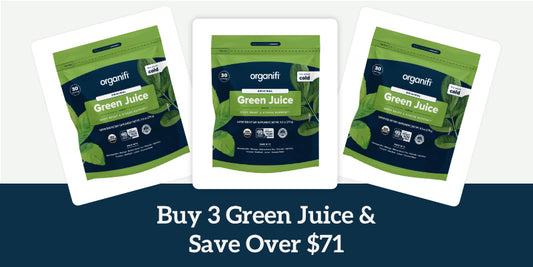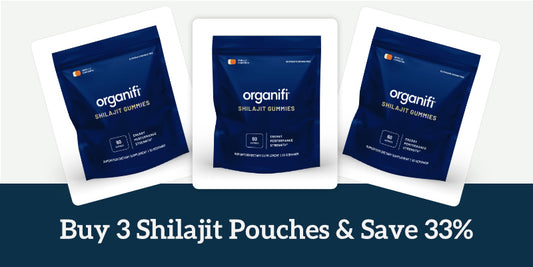Reishi mushroom benefits have gotten lots of media attention in later months. However, there is a significant amount of contradicting or confusing information available: Are they poisonous? Are they chewy? Is there a “right way” to eat Reishi Mushrooms? Read on and find out.
- Reishi mushrooms are adaptogenic fungi that grow in various humid locations in Asia, North & South America, Australia, and Europe, and have been a staple of traditional Eastern medicine for at least 2,000 years.
- Dried reishi mushroom has been consumed in teas, tinctures, and extracts for years due to its potent antioxidant qualities, making it a famous and coveted “anti-aging” mushroom.
- Reishi mushroom benefits include immune system, cognitive ability, and liver function support. Research shows they may also lower blood pressure, have anti-inflammatory properties, and even fight cancer.
- There are multiple types of reishi mushrooms (Ganoderma or Ling Zhi) with varying taste and appearance: Akashiba or red reishi, Aoshiba or blue reishi, Murakakishiba or purple reishi, Kuroshiba or white reishi, and Kishiba or Yellow Reishi. The red dried reishi mushroom is the one mostly used for its therapeutic power.
Reishi Mushroom, Ganoderma or Ling Zhi?
As reishi mushroom benefits become more and more studied by western medicine (there are over 3,300 research papers published in the US National Library of Medicine alone) its name scientific name and popular names have gotten more famous, and at times confusing.
However, they are all used to refer to the same type of mushroom found in health food stores and medicinal studies.
These are all names for natural and dried Reishi Mushroom:
- Linghzi: Chinese words meaning “herb of spiritual potency”
- Reishi: Sino-Japanese loanword deriving from the Chinese língzhī
- Linh chi: Vietnamese word for the mushroom, also potentially derived from the Chinese one. Translates as “supernatural mushroom”
- Ganoderma: scientific name given to a type of polypore fungi in the family Ganodermataceae that comprises approximately 80 species.
A Brief History of the Reishi Mushroom
Reishi mushroom or Lingzhi references can be found at least one hundred times in classic Chinese literature, from poems to herbal medicine anals. In the Chinese history book, Hanshu or ‘Book of Han’, it is referred to as the “Mushroom of Immortality.”
The healing or therapeutic reishi mushroom benefits are also found in herbal medicine texts all over Asia dating back at least 2,000 years.
It used to be a rarely found mushroom, which increased its perceived value and price. It was still used in China in the 1950s to gain an official’s favor. In the 1970s it was successfully artificially cultivated and started to be traded more widely dehydrated or powder form.
Red dried reishi mushroom is the one often commercialized and studied today for its purported medicinal benefits.
Reishi Mushroom Benefits
Dubbed the mushroom of immortality Red Reishi (in medical research G.lucidum) is a very potent adaptogen, which means it helps the body adapt or adjust to stress. It has potent antioxidant properties which help reduce oxidative stress caused by damaging free radicals in the body and may help the body regulate the cortisol hormone, often called the “stress hormone.”
Reishi mushroom benefits liver detox as well as the immune, and lymphatic system through its bioactive components, including antioxidant flavonoids such as quercetin, rutin, myricetin, and morin which aid in detoxifying the body. Research shows that it has “antitumor, antimicrobial, antioxidant and antiacetylcholinesterase.”
As the “mushroom of spiritual potency,” a potentially calmer mind is one of the reishi mushroom benefits; because it may have the ability to lower or maintain cortisol levels, aid in the regulation of the adrenal glands, and detoxify the body, it could help with focus, concentration, and memory-strengthening neuroplasticity. Animal studies show promising anti-depressant results.
Other reishi mushroom benefits:
- May reduce chemotherapy side-effects
- Might slow the aging process due to its antioxidant properties
- May aid in wound healing
- Could improve circulation
- Reduce inflammation
- May increase B and T cells in white blood cells (immune response killer cells)
How to Consume Fresh and Dried Reishi Mushrooms
Reishi mushrooms are not poisonous, but can be chewy or too hard/bitter to eat fresh; therefore, there is a recommended way to consume fresh reishi vs. dried reishi mushrooms, in order to leverage their health benefits, avoid potential side-effects, and enjoy them in a way that keeps their singularly bitter taste to a minimum.
Fresh Reishi Mushrooms
When fresh the Reishi mushroom is soft, has a red or reddish cap that looks a little like a kidney, has no gills on the underside of the cap, and a white or off-white edge. It is difficult to find fresh reishi mushrooms at a supermarket or health food store, which is why dried reishi mushroom are more readily available nowadays.
You may also harvest them yourself if you leave near a forest and can identify them easily, but even then, you might want to dry them out for future use.
How to prepare them:
- Pros: easy to prepare, hardly any work involved.
- Cons: might taste bitter and not look appealing. Add soy sauce, tamari sauce, salt, or seaweeds to counter the bitter taste.
- Pros: hidden flavor, all medicinal power saved in the liquid.
- Cons: may change the taste of the soup if not properly balanced. Taste often
- Pros: Great when getting sick or already sick, stronger concentration and medicinal value.
- Cons: Marked and sometimes very bitter taste. Brave it, if already sick with a cold or similar, add lime, ginger and/or honey to make it more palatable.
Dried Reishi Mushrooms
More readily available in bagged tea form, extract, or powder dried reishi mushroom benefits are actually ten times more powerful than in the fresh form. It is not a common occurrence in nature, but research showed more potency in extract and dried reishi mushroom, than in fresh mushrooms in preliminary human studies.
- Add dried reishi mushrooms to prepared meals like veggie rice, stir fry, and even porridge.
- Take in powder-capsules (see recommended dosage)
- Add to other infusions
- Add to tea
- Add to smoothies (great when combined with yogurt)
- Take in supplement form
Dried reishi mushrooms are one of the power-packed superfoods in our red juice.
Potential Side-Effects:
Patients undergoing chemotherapy, radiotherapy, and under liver support medication, blood thinners, or platelet-raising medication should consult with a licensed doctor before consuming reishi mushrooms. There is no evidence of negative side-effects on pregnant or lactating women, but it is advisable that they also consult a physician prior to taking tinctures or reishi capsules.
Large doses of dried reishi mushroom extract, powder, or supplement may lead to mild digestive discomfort and/or diarrhea.
Get the Most out of the Reishi Mushroom Benefits with the Right Dosage:
Depending on the reishi mushroom benefits you seek, the extract, tea, or dried reishi mushroom supplement dosage will vary. Consider consulting with a licensed physician or herbalist if you have a specific health problem. For the general health benefits of Reishi:
- Fresh reishi mushroom: 25 to 100 gr/day
- Dried reishi mushrooms:
- 2 to 5 grams for severe health conditions. (4,500 mg daily for gout, osteoarthritis, and rheumatism according to the MARA Institute of Technology in Malaysia)
- 1 1/2 g -9g per day for moderate to severe health conditions (1,500mg for migraines and 2,500 mg for blood pressure)
- 1 1/2 g per day for maintenance or general immune, hepatic, and lymphatic system support.
The Takeaway:
Reishi mushroom benefits are being studied by modern western medicine with many positive results as an antioxidant, antitumor, hepatoprotective, antimicrobial and immuno-supportive agent. It is not poisonous but may lead to uncomfortable bowel movements if consumed in excess. It’s got powerful therapeutic and medicinal benefits and may be consumed safely for preventative care purposes.




